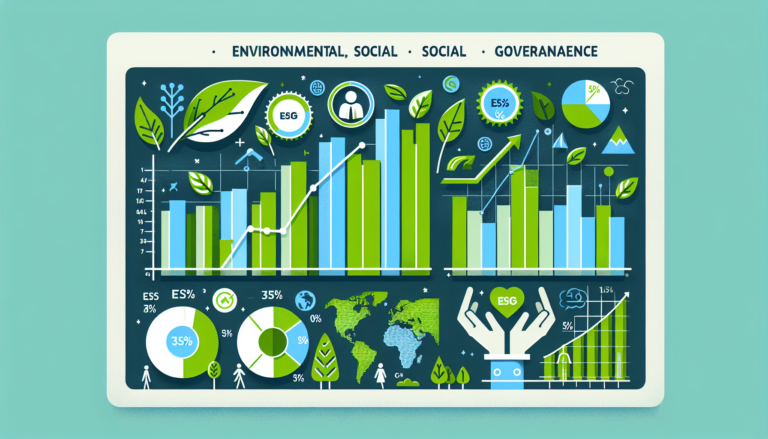Understanding the Nike ESG report: Transparency in practice
The Nike ESG report outlines the company’s commitments to sustainability, social responsibility, and ethical governance, highlighting efforts in reducing carbon emissions, promoting diversity, and enhancing stakeholder communication in the footwear industry.
Nike ESG report serves as a vital tool for understanding the company’s commitment to sustainability and accountability. Curious about how this affects you and the planet? Let’s dive into the insights.
What is the Nike ESG report?
The Nike ESG report is a comprehensive document that showcases the company’s commitment to environmental, social, and governance (ESG) practices. This report highlights Nike’s efforts to enhance transparency and accountability in their operations. It serves as a tool for stakeholders to understand how Nike is addressing critical issues related to sustainability and corporate responsibility.
One of the key aspects of the report is its focus on sustainable practices. Nike outlines initiatives aimed at reducing carbon emissions, minimizing waste, and promoting recycling. These efforts reflect their dedication to creating a more sustainable future for the industry and the planet.
Social responsibility is another significant theme within the Nike ESG report. The company emphasizes its commitment to ethical labor practices and community engagement. By investing in initiatives that support diverse communities, Nike aims to foster inclusivity and drive positive social change.
The governance section of the report provides insights into Nike’s leadership and ethical standards. It illustrates how the company manages risks and aligns its strategies with stakeholder expectations. By addressing these elements, the Nike ESG report not only informs the public but also sets a benchmark for other companies in the industry.
Importance of ESG reporting for companies
ESG reporting is crucial for companies aiming to enhance their transparency and accountability. By providing insights into their environmental, social, and governance practices, firms can build trust with stakeholders. This kind of reporting helps companies communicate their commitment to sustainability and ethical operations more effectively.
One of the primary benefits of ESG reporting is improved reputation. Companies that transparently share their ESG efforts are often viewed more favorably by customers and the public. This positive image can lead to increased customer loyalty and even attract socially conscious investors.
Moreover, regulatory bodies are placing greater emphasis on sustainability disclosures. Firms that engage in ESG reporting can proactively address compliance requirements, thus minimizing potential legal obligations and penalties. This ensures that they remain ahead of industry standards, enhancing their competitive edge.
Additionally, effective ESG reporting provides valuable data that can inform strategic decision-making. Companies can leverage insights gained from ESG metrics to optimize operations, reduce risks, and improve overall sustainability performance. In summary, the importance of ESG reporting extends far beyond compliance; it serves as a critical tool for long-term business success and stakeholder engagement.
Key findings from the latest Nike ESG report
The latest Nike ESG report reveals several key findings that highlight the company’s ongoing commitment to sustainability and social responsibility. Among these findings, one prominent focus is on reducing carbon emissions. Nike has set ambitious targets to decrease its environmental footprint, aiming for a significant reduction in greenhouse gas emissions by 2025.
Another critical finding centers around sustainable materials. Nike has increased its use of recycled and innovative materials in product manufacturing. This not only lowers the environmental impact but also aligns with growing consumer demand for eco-friendly products.
The report emphasizes Nike’s dedication to diversity and inclusion within its workforce. It outlines initiatives designed to promote gender equality and enhance opportunities for underrepresented communities. This commitment is reflective of a broader industry trend, where companies recognize the value of a diverse workforce.
Additionally, Nike’s efforts in community engagement are notable. The ESG report details partnerships with local organizations, aimed at driving positive change in areas like education and physical fitness. These community-oriented approaches not only strengthen Nike’s brand but also contribute to a healthier society.
How Nike addresses environmental challenges
Nike is actively addressing environmental challenges through a multi-faceted approach that prioritizes sustainability across its operations. One key strategy is the use of renewable energy in manufacturing facilities. By transitioning to clean energy sources, Nike significantly reduces its carbon footprint and supports global efforts to combat climate change.
Another important aspect of Nike’s strategy involves the innovation of sustainable materials. The company invests in research and development to create products using recycled and organic materials. This not only lessens the ecological impact of their supply chain but also caters to the increasing consumer demand for eco-friendly products.
Nike’s commitment to waste reduction is noteworthy as well. The company has implemented initiatives to minimize waste in its production processes. Programs such as the “Move to Zero” campaign aim to achieve zero waste in facilities, thereby promoting a more circular economy.
Furthermore, Nike emphasizes the importance of education and partnerships in addressing environmental issues. Collaborating with local communities and organizations enables Nike to extend its influence and promote sustainable practices beyond its own operations, fostering global environmental stewardship.
Social initiatives outlined in the Nike ESG report
The Nike ESG report highlights several social initiatives that are vital to the company’s commitment to corporate responsibility. One significant initiative focuses on community engagement, where Nike collaborates with local organizations to promote physical activity, wellness, and education. These partnerships help empower communities and improve overall health.
Another key aspect is the emphasis on diversity and inclusion within the workplace. Nike has implemented programs aimed at increasing representation across all levels of the company. This drive for a more inclusive workforce not only fosters innovation but also ensures that a wide range of perspectives are considered in decision-making processes.
Nike also invests in youth mentorship programs, encouraging skill development among younger generations. By supporting initiatives that provide guidance and resources, Nike helps to prepare youth for future opportunities in sports and business alike.
Through its global initiatives, Nike aims to address societal issues such as education inequality and access to sports. This commitment is evident in the company’s investment in programs that specifically target underprivileged communities. Thus, Nike’s social initiatives outlined in the ESG report reflect a broad understanding of the company’s role in fostering social equity and community well-being.
Governance practices highlighted by Nike
The governance practices highlighted by Nike in its ESG report showcase the company’s commitment to ethical leadership and transparency. One of the key aspects is the emphasis on accountability. Nike has implemented a robust framework that ensures its executives and board members uphold high standards of integrity in their decision-making processes.
Another important element is risk management. Nike conducts regular assessments to identify potential risks that could impact its operations or reputation. By proactively addressing these issues, the company enhances its resilience and maintains stakeholder confidence.
Nike also prioritizes diversity in leadership. The company actively works to ensure that its board reflects a broad range of perspectives, promoting inclusivity at the highest levels of governance. This approach not only fosters a more dynamic decision-making process but also aligns with global trends towards greater corporate responsibility.
Furthermore, Nike engages in stakeholder communication to ensure that the voices of employees, customers, and communities are heard. Regular dialogue with various stakeholders informs Nike’s strategies and helps address concerns related to governance practices. These comprehensive governance strategies highlight Nike’s dedication to ethical business conduct and its aim to lead by example in the industry.
Comparing Nike’s ESG efforts with competitors
Comparing Nike’s ESG efforts with its competitors reveals significant insights into industry standards and practices. Nike’s commitment to sustainability sets a benchmark in the footwear and apparel sector. It has made substantial strides in reducing its carbon footprint and increasing the use of recycled materials in product lines, which often exceeds the efforts of other leading brands.
When assessing social initiatives, Nike shines through its focus on diversity and inclusion. The company actively shares its workplace demographics and set goals to improve representation. In contrast, some competitors are less transparent, making it harder for stakeholders to gauge their commitment.
In terms of governance, Nike has established comprehensive frameworks to ensure ethical practices and accountability. This proactive approach compares favorably with several competitors that may adopt a more reactive stance on governance issues. Nike’s continuous engagement with stakeholders enhances its reputation, setting it apart from others who might neglect this vital area.
While many brands highlight their ESG initiatives, Nike’s comprehensive, transparent, and strategic execution often places it ahead of the competition. This proactive stance not only fulfills corporate responsibility but also resonates with consumers who are increasingly prioritizing sustainable and ethical brands in their purchasing decisions.
The future of ESG compliance in the footwear industry
The future of ESG compliance in the footwear industry is poised for significant evolution as companies increasingly embrace sustainable practices. As environmental concerns rise, industry leaders are recognizing the need to implement robust ESG frameworks that not only meet regulatory requirements but also resonate with consumer values.
One major trend is the growing importance of transparency. Companies are expected to disclose their ESG efforts more comprehensively, and consumers increasingly demand clarity on sustainability practices. This shift will drive footwear brands to adopt clearer standards for reporting and improving their ESG performance.
Innovation will also play a crucial role in shaping future compliance. Footwear brands are likely to invest in sustainable materials and eco-friendly manufacturing processes. Innovations such as biodegradable materials and closed-loop systems for recycling footwear will become essential as companies strive to minimize their environmental footprints.
Furthermore, the collaboration between businesses and regulatory bodies will enhance ESG initiatives across the industry. Partnerships with non-governmental organizations and stakeholders can foster shared standards, allowing for consistent compliance measures to reduce greenwashing. In summary, the future landscape of ESG compliance in the footwear industry will be characterized by heightened accountability, sustainable innovation, and collaborative efforts aimed at bolstering ethical practices.
Frequently Asked Questions
What are the main focuses of Nike’s ESG report?
Nike’s ESG report focuses on sustainability, social responsibility, and governance practices. It highlights efforts to reduce carbon emissions, promote diversity, and ensure ethical business conduct.
How does Nike address environmental challenges?
Nike addresses environmental challenges by using renewable energy, increasing the use of recycled materials, and implementing waste reduction initiatives through programs like ‘Move to Zero’.
In what ways does Nike promote social initiatives?
Nike promotes social initiatives by engaging in community programs, supporting diversity and inclusion in the workplace, and investing in youth mentorship programs.
What governance practices does Nike have in place?
Nike has robust governance practices that emphasize accountability, risk management, and stakeholder communication, ensuring ethical leadership and transparency.
How does Nike’s ESG performance compare to its competitors?
Nike often leads in ESG performance by setting benchmarks in sustainability, transparency, and social responsibility, surpassing many of its competitors in these areas.
What does the future hold for ESG compliance in the footwear industry?
The future of ESG compliance in the footwear industry will focus on heightened transparency, sustainable innovations, and collaborative efforts to promote industry-wide ethical practices.






